Swami Vivekananda said that the backbone of India is religion. Most Indians imbibe this spirit of religion and the values contained in them through the medium of our great epics. By way of play gadgets personifying characters that remind us of our great tradition and values, the Ramayana Park which is located close to the Swami Vivekananda Park, continues to draw scores of visitors including the residents of the neighborhood and the people travelling on the Coimbatore – Ooty highway. It is our hope that Park continues to serve as a means of healthy and enlightening entertainment to the children.
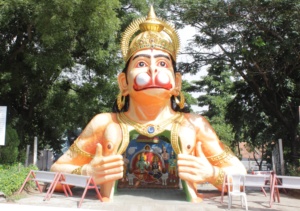 1. Hanuman
1. Hanuman
The mighty Hanuman, the great Ramayana hero, also called Maruthi or Mahavir, is the noblest devotee of Rama. This intelligent devotee was well versed in all the scriptures and was pure in thought, words, and deeds. He had vowed to remain a celibate throughout his life, and therefore he looked up on every woman as his mother. His devotion to Rama was eternal, and he considered himself the most obedient servant of Rama! This sadhana of having a servant-attitude towards God is called Daasya-bhaava. Hanuman is worshipped all over in India as the deity of purity, power, and eliminator of all evils.
2. Rama – An Avatara of Vishnu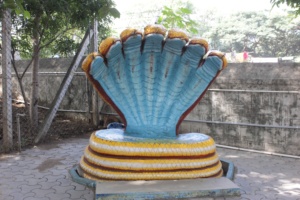
Ravana, King of the demons, drunk with the power acquired by a boon granted to him by Brahma, was causing untold misery and hardship to the devas. Unable to bear the torment of the raksahsha king, the devas held a conference and pleaded with Lord Brahma for deliverance from the tyranny of Ravana. Brahma knew that he had granted Ravana the boon prayed for by him that he should be invulnerable and invincible against Devas, Asuras, Gandharvas and other such beings. But in his arrogance, Ravana did not care to ask for security against mankind. As Brahma revealed this fateful omission, all the gods rejoiced and turned to Lord Vishnu and begged him to be born as a man and put an end to Ravana and his atrocities. Vishnu agreed and assured the Devas that he would be born as four sons to King Dasharatha, in the city of Ayodhya, who was then performing a fire sacrifice for progeny.
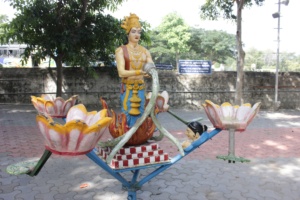 3. Putrayaaga
3. Putrayaaga
Dasharatha was the King of Kosala, an ancient kingdom, with Ayodhya as its capital. Dasharatha was loved by one and all. His subjects were happy and his kingdom was prosperous. Even though Dasharatha had everything that he desired, he was very sad at heart he had no children.
The childless Dasharatha was advised by his family priest Vashishtha to perform a fire-sacrifice ceremony to seek the blessings of God for children. While performing the fire-worship ceremony, a majestic figure rose from the sacrificial fire and handed to Dasharatha a bowl of rice pudding, saying, ‘God is pleased with you and has asked you to distribute this rice pudding (payasa) to your wives – they will soon bear your children.’
The King received the gift joyfully and distributed the payasa to his three queens. The eldest queen gave birth to the eldest son Rama. Bharata, the second son, was born to Kaikeyi, and Sumitra gave birth to twin sons, Lakshmana and Shatrughna. Sri Rama’s birthday is celebrated now as Ramanavami.
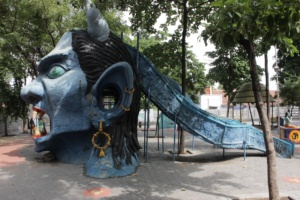 4. Taatakaa Vadha
4. Taatakaa Vadha
One day, the revered sage Vishwamitra came to Ayodhya and requested Dasharatha to send Rama to kill the Rakshasas who were disturbing his fire-sacrifices. Rama was then only fifteen years old. After obtaining permission from his father, Rama accompanied the sage Vishwamitra along with Lakshmana. The party soon reached Dandaka forest where the Raakshasi Taatakaa lived with her son Maaricha. Vishwamitra asked Rama to challenge her. Rama strung his bow and twanged the string. The wild animals ran helter-skelter in fear. Taatakaa too heard the sound but became incensed. Mad with rage, roaring thunderously, she rushed at Rama. A fierce battle ensued between the huge Rakshasi and Rama. Finally, Rama pierced her heart with a deadly arrow and Taatakaa crashed down to the earth. Vishwamitra was pleased. He taught Rama several Mantras (divine chants) with which Rama could summon many divine weapons (by meditation) in order to fight against evil.
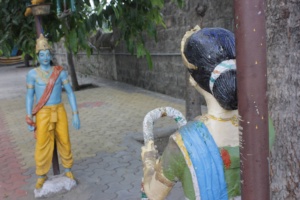 5. Swayamvara
5. Swayamvara
Janaka was a saintly king. He had received a bow from Lord Shiva. It was strong and heavy. He wanted his beautiful daughter Sita to marry the bravest and strongest prince in the country. So he had vowed that he would give Sita in marriage only to the one who could string that great bow of Shiva. Many had tried before. None could even move the bow, let alone string it.
One day sage Vishwamitra arrived with Rama and Lakshmana at the court of Janaka and requested King Janaka to show the bow of Shiva to Rama so that he could try to string it. Janaka looked at the young prince and assented, though with doubts. The bow was stored in an iron box mounted on an eight-wheeled chariot. Janaka ordered his men to bring the bow and place it in the middle of a big hall filled with many dignitaries.
Rama placed one end of the bow against his toe, put forth his might, and bent the bow to string it, when, to everyone’s surprise, the bow snapped in two! Sita was relieved. She had liked Rama right at the first sight.
6. Shravana Kumara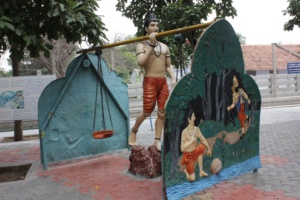
King Dasharatha had the skill to shoot arrows against even unseen targets, aiming only by any sound that the target may have generated. When he was young, he went out one night to hunt on the banks of the Sarayu river for the pleasure of exercising this skill. In the dense darkness he heard a gurgling sound as of a boar. At once he aimed an arrow in the direction but was shocked to hear a human voice exclaim, ‘Alas! I am going to die!’ What is to happen to my old blind parents now, with none to look after them?’
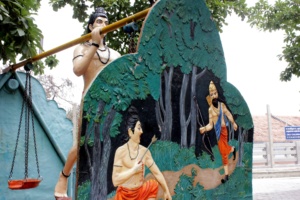 This is how King Dasharatha committed the great sin of killing Shravana Kumara. The blind parents of the young acetic suffered great anguish on receiving the unexpected and tragic news of the death of their beloved son. They lost their wish to live and ascending the funeral pyre cursed Dasharatha thus: ‘This great grief you have brought about for us, you too will endure in good time. You will die of grief, parted from your son.’
This is how King Dasharatha committed the great sin of killing Shravana Kumara. The blind parents of the young acetic suffered great anguish on receiving the unexpected and tragic news of the death of their beloved son. They lost their wish to live and ascending the funeral pyre cursed Dasharatha thus: ‘This great grief you have brought about for us, you too will endure in good time. You will die of grief, parted from your son.’
Like a released arrow, the sin committed by the king due to inadvertence had to be suffered. In due course, sorrowing and lamenting for his beloved sons, the great king Dasharatha also died a lonely death. Men in their ignorance sometimes do great evils for the sake of some slight momentary pleasure. Then when the time comes, the price has to be paid. This is the unfailing law of cause and effect.
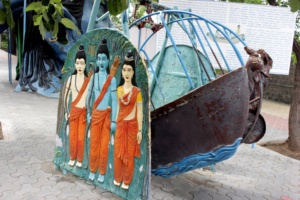 7. Vanavaasa
7. Vanavaasa
For the next twelve years Rama and Sita lived happily in Ayodhya. Rama was loved by all. He was a joy to his father, Dasharatha, whose heart nearly burst with pride when he beheld his son. As Dasharatha was growing older, he summoned his ministers seeking their opinion about crowning Rama as Prince of Koshala. They unanimously welcomed the suggestion. Then Dasharatha announced the decision and gave orders for the coronation of Rama. During this time, Bharata and his favorite brother, Shatrughna, had gone to see their maternal grandfather and were absent from Ayodhya.
Kaikeyi, the fickle minded mother of Bharata, had a wicked maid, Manthara. Manthara wanted Bharata to be the king and so she repeatedly gave Kaikeyi her poisoned suggestions, clouding Kaikeyi’s mind and heart with suspicion and doubt. Manthara succeeded in persuading Kaikeyi to ask for two long- forgotten boons from Dasharatha which he had offered her for saving him when he was mortally wounded in a fight with the Asuras. Both of them knew that Dasharatha would never fall back on his words.
The night before the coronation, Kaikeyi asked her two boons: He should crown her son Bharata as the King of Koshala, and banish Rama from the kingdom for fourteen years. Dasharatha could hardly believe his ears and, unable to bear what he had heard, fell down unconscious. But Rama accepted the fate with a smile and left for vanavaasa with Sita and Lakshamana.
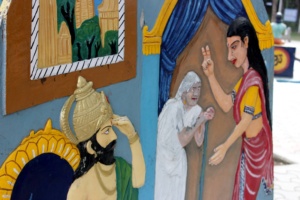
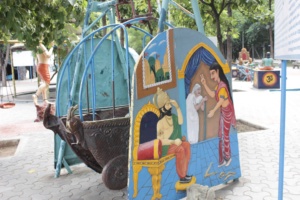
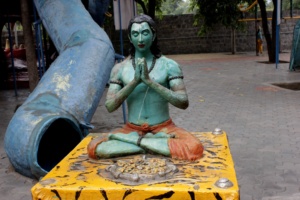 8. Bharata Milap
8. Bharata Milap
By the time Prince Bharata was brought back from the kingdom of Kekaya where he was residing in the palace of his maternal uncle, king Dasaratha had passed away sorrowing. Once at Ayodhya, Prince Bharata uncovered the intrigue of Manthara and was stunned by the news. He cried at his deluded mother for hoping that he would accept the kingdom which rightfully belonged to his beloved elder brother Rama.
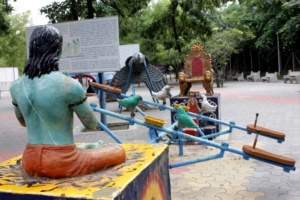 Bharata resolved to bring Rama back to Ayodhya as quickly as possible. He started for Chitrakuta where Rama was by then staying. Seeing Rama, Bharata fell at his feet, begging forgiveness for all the wrong doings and asking Rama to return and rule the kingdom. But Rama firmly replied that he would not, disobey the wishes of Dasharatha. He persuaded Bharata to understand that they both must fulfill the two boons of received by Kaikeyi — Bharata to rule the kingdom, and Rama to return to Kosala after fourteen years only. When Bharata realized Rama’s firmness in fulfilling his promises, he begged Rama to give him his sandals.
Bharata resolved to bring Rama back to Ayodhya as quickly as possible. He started for Chitrakuta where Rama was by then staying. Seeing Rama, Bharata fell at his feet, begging forgiveness for all the wrong doings and asking Rama to return and rule the kingdom. But Rama firmly replied that he would not, disobey the wishes of Dasharatha. He persuaded Bharata to understand that they both must fulfill the two boons of received by Kaikeyi — Bharata to rule the kingdom, and Rama to return to Kosala after fourteen years only. When Bharata realized Rama’s firmness in fulfilling his promises, he begged Rama to give him his sandals.
Bharata told Rama that the sandals were to represent Rama, and he (Bharata) would carry out the duties of a king only as Rama’s representative. Rama gracefully agreed. Bharata carried the sandals to Ayodhya with great reverence, and after reaching the capital, placed the sandals on the throne and governed the kingdom as Rama’s representative. But he did not live in the palace during the fourteen years and lived like a hermit, as Rama did, counting the days for Rama to return.
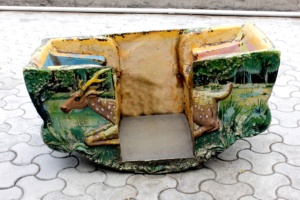 9. The Golden Deer
9. The Golden Deer
Surpanakha, the sister of Ravana, lived in the forest around Panchavati. One day Surpanakha happened to see Rama and instantly fell in love with him. She requested Rama to be her husband but was rejected. Surpanakha got furious and attacked Sita considering her to be the reason for her being rejected. Lakshmana swiftly intervened, and cut off her nose and ears with his dagger. Surpanakha ran away with her bleeding nose, crying in pain, to seek help from her Asura brothers, Khara, Dushana and Ravana. Surpanakha incited her brother to abduct Sita and avenge her insult. Ravana had an uncle, Maaricha, who had the power of changing himself into any form he wanted, along with the appropriate voice-imitation. Ravana forced Maricha to take the form of a beautiful golden deer and lead both the brothers Rama and Lakshmana away from their cottage in the Panchavati.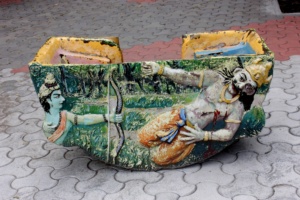
Seeing the beautiful deer, Sita was attracted to the golden deer and requested Rama to capture it for her. To olige his dear wife, Rama chased the deer, hurriedly instructing Lakshmana to look after Sita. Very soon Rama realized that the deer was not a real one. He shot an arrow which hit the deer and Maaricha regained his true form. Before dying, Maaricha imitated Ram’s voice and shouted, “Oh Lakshmana! Oh Sita,! Help! Help!”
10. Sita Harana & Lakshmana Rekhaa
Sita heard the voice and asked Lakshmana to run and rescue Rama. Lakshmana was hesitant but Sita’s insistence forced him to depart. Finally Lakshmana agreed. Before his departure, he drew a magic circle, with the tip of his arrow, around the cottage and asked her not to cross the line. ‘As long as you stay within the circle you will be safe with the grace of God’, said Lakshmana and hurriedly left in search of Rama.
As soon as Ravana found Sita alone, he disguised himself as a hermit and came near Sita’s cottage. He stood beyond the protective circle line of Lakshmana, and asked for alms (bhiksha). Sita came out with a bowl full of rice to offer to the holy man, while staying within the circle. The hermit asked her to come near and offer. Sita was unwilling to cross the line, but Ravana pretended to leave the place without receiving alms. As Sita did not want to annoy the sage, she crossed the line to offer the alms. Immediately Ravana pounced on Sita, and soon his chariot, with Sita in it, left the ground and flew over the clouds on way to Lanka.
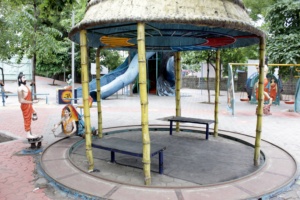
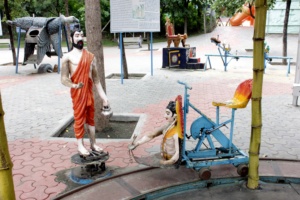
11. Jataayu
Jataayu was the brother of Sampaati, the son of Aruna, the dawn-god, who was brother to Garuda, the great eagle-vehicle of Lord Vishnu. He was also a friend of Dasharatha. When Rama decided to build a hut in Panchavati, Jataayu, the King of the eagles, assured him that he will protect Sita whenever the two brothers went hunting in the forest. The prince was pleased and accepted the offer with gratitude.
When Ravana was speeding away to Lanka after kidnapping mother Sita, the old Jataayu intercepted him and fought gallantly till he was mortally wounded. In spite of being in great pain, Jataayu did not allow his life-breath to leave him before the two brothers were able to trace him. Jataayu narrated with great pain the abduction of Sita by the cruel and cowardly Ravana, and died on the lap of Rama. Rama and Lakshmana burried Jataayu, whom they loved as their second father, and then moved southward in search of Sita.
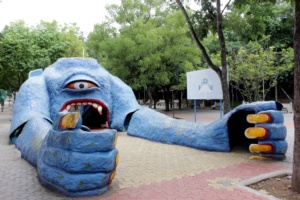 12. Kabandha
12. Kabandha
During their exile, Rama and Lakshmana were once passing through a forest in search of Sita. The two princes were suddenly caught by a tremendously big Rakshasa of ugly form, without head or feet. His mouth was in his great belly and he had two enormous arms which, without moving from his place, he could stretch out and clutch a tiger, bear or any other living thing within reach, and swallow them. He had only one eye, which was placed in his chest but which was terrible to behold. Caught by this monster, the princes were for a while bewildered and did not know what to do.
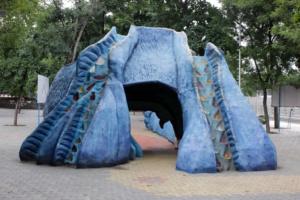 Then Rama told Lakshmana: ‘Let us not be confused. You will cut off one arm, I shall cut off the other.’ And so they did. The name of the monster was Kabandha, which means ‘the barrel-shaped one.’ Once his arms were severed, he was helpless and began to explain: ‘On account of my evil deeds I was cursed by Indra to bear this form and this name. I believe you are Rama and Lakshmana. Indra promised me freedom from the curse when you two should come and cut off my arms and commit this body of mine to the flames.’ The princes set fire to his body as desired by the unfortunate monster, and there arose from the flames a lovely being which entered a heavenly chariot and ascended to the celestial world. Before going, he said to Rama: ‘You will assuredly regain Sita. Go to the beautiful banks of the Pampa and seek the help of Sugriva living there on the Rishyamukha hill. Gain his friendship, and you will succeed in your attempt.’ Saying this, Kabandha disappeared.
Then Rama told Lakshmana: ‘Let us not be confused. You will cut off one arm, I shall cut off the other.’ And so they did. The name of the monster was Kabandha, which means ‘the barrel-shaped one.’ Once his arms were severed, he was helpless and began to explain: ‘On account of my evil deeds I was cursed by Indra to bear this form and this name. I believe you are Rama and Lakshmana. Indra promised me freedom from the curse when you two should come and cut off my arms and commit this body of mine to the flames.’ The princes set fire to his body as desired by the unfortunate monster, and there arose from the flames a lovely being which entered a heavenly chariot and ascended to the celestial world. Before going, he said to Rama: ‘You will assuredly regain Sita. Go to the beautiful banks of the Pampa and seek the help of Sugriva living there on the Rishyamukha hill. Gain his friendship, and you will succeed in your attempt.’ Saying this, Kabandha disappeared.
13. Rishyamukha Mountain
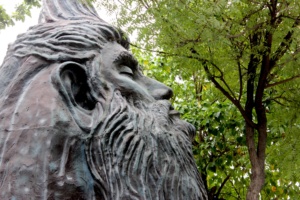 Sri Rama met king Sugreeva on the Rishyamukha Mountain. Sugreeva had run away from his kingdom in fear of his elder brother Vali – the powerful king of Kishkindha. Due to a misunderstanding, Vali considered Sugreeva an usurper of the throne of Kishkindha. He had thrashed his brother almost to death and forcibly taken Sugreeva’s wife as his queen. Somehow Sugreeva escaped and ran for his life, but was not allowed to rest anywhere as he was relentlessly chased by Vali. Finally, on the advice of his faithful friends and ministers, Sugriva took refuge on the heights of Rishyamukha Mountain, because Vali could dare not enter this region, for he was forbidden to enter there.
Sri Rama met king Sugreeva on the Rishyamukha Mountain. Sugreeva had run away from his kingdom in fear of his elder brother Vali – the powerful king of Kishkindha. Due to a misunderstanding, Vali considered Sugreeva an usurper of the throne of Kishkindha. He had thrashed his brother almost to death and forcibly taken Sugreeva’s wife as his queen. Somehow Sugreeva escaped and ran for his life, but was not allowed to rest anywhere as he was relentlessly chased by Vali. Finally, on the advice of his faithful friends and ministers, Sugriva took refuge on the heights of Rishyamukha Mountain, because Vali could dare not enter this region, for he was forbidden to enter there.
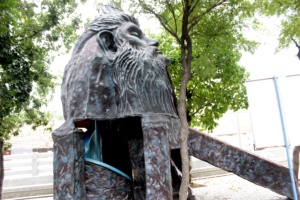 It had so happened that in his younger days, Dundubhi, an Asura in a buffalo-form, challenged Vali and a great battle followed. Finally Vali killed the buffalo-demon and flung the dead buffalo so far that it fell on the ground at a distance of a yojana. Drops of blood from the Asura’s body were carried by the wind and they fell on the ashrama of Maatanga. The sage was in wrath and soon found that Vali, in his pride, had flung the bleeding carcass and desecrated the holy area. The sage pronounced a curse: ‘If this Vali enters the precincts of this ashrama, he will lose his life.’ That is why Sugriva chose Rishyamukha to live in its safety. Out of fear of the curse, Vali never approached this place.
It had so happened that in his younger days, Dundubhi, an Asura in a buffalo-form, challenged Vali and a great battle followed. Finally Vali killed the buffalo-demon and flung the dead buffalo so far that it fell on the ground at a distance of a yojana. Drops of blood from the Asura’s body were carried by the wind and they fell on the ashrama of Maatanga. The sage was in wrath and soon found that Vali, in his pride, had flung the bleeding carcass and desecrated the holy area. The sage pronounced a curse: ‘If this Vali enters the precincts of this ashrama, he will lose his life.’ That is why Sugriva chose Rishyamukha to live in its safety. Out of fear of the curse, Vali never approached this place.
14. Vali – The Vanara King
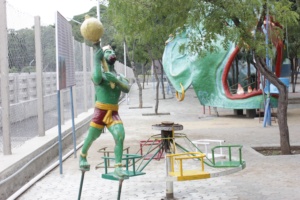 Sugreeva had run away from his kingdom out of fear of his elder brother Vali, who was the powerful king of Kishkindha. Their enimity arose from the following incident: As it happened, once a demon, Mayavi, challenged Vali’s supremacy. Vali accepted the challenge and a fight broke out between the two. They entered some cave and continued their fight inside. Vali had specifically told Sugreeva to remain stationed at the mouth of the cave and wait for him. ‘I will kill this demon and return,’ Vali had told Sugreeva. But even after many days, he did not return. One day, blood was seen flowing from the cave, and Sugreeva thought that Vali must have been killed, and possibly the demon would kill him too. So Sugreeva ran to his kingdom after closing the entrance to the cave with a huge boulder. After performing the last rites for his beloved brother, whom he considered killed, Sugriva declared himself to be the new king.
Sugreeva had run away from his kingdom out of fear of his elder brother Vali, who was the powerful king of Kishkindha. Their enimity arose from the following incident: As it happened, once a demon, Mayavi, challenged Vali’s supremacy. Vali accepted the challenge and a fight broke out between the two. They entered some cave and continued their fight inside. Vali had specifically told Sugreeva to remain stationed at the mouth of the cave and wait for him. ‘I will kill this demon and return,’ Vali had told Sugreeva. But even after many days, he did not return. One day, blood was seen flowing from the cave, and Sugreeva thought that Vali must have been killed, and possibly the demon would kill him too. So Sugreeva ran to his kingdom after closing the entrance to the cave with a huge boulder. After performing the last rites for his beloved brother, whom he considered killed, Sugriva declared himself to be the new king.
A few months passed thus. The injured Vali recovered from his wounds and regained his strength to return to his kingdom. He trembled with rage when he found that his unfaithful brother had ascended the throne. He suspected foul play and thrashed Sugreeva almost to death. Somehow Sugreeva escaped and ran for his life to take shelter on the heights of the Rishyamukha Mountain. Besides, Vali also forcibly took Sugreeva’s wife as his new queen. Sugreeva and Hanuman pleaded with Rama that Vali was unjust and a cruel king, and that his rule was causing immense hardship and suffering to the people of Kishkindha. They further entreated him that he must put an end to Vali’s life and make Sugreeva the king again.
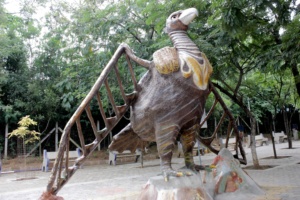 15. Sampaati
15. Sampaati
Reaching the seashore, the heroic monkeys searched a round and they were startled to discover that they had exceeded the time set to return to Kishkindha. They thought that Sugriva would surely punish them to death for failing in their mission. So they felt that it was preferable to fast to death rather than face him. In the meanwhile, from a neighboring hill, Sampaati, the vulture-King, saw this crowd of Vaanaras resigning themselves to death. Having lost his wings and being unable to move, Sampaati had been famishing for a long time. He now rejoiced in anticipation of easy food for a long while without effort.
The Vaanaras on their part, expecting death, were recalling the past and and loudly lamenting over all that had happened. While listening to these lamentations, Sampaati was startled at the mention of Jataayu, his brother. Hearing the Vaanaras speak of him as dead, Sampaati cried in agony and wanted to know if his beloved Jataayu was indeed dead. The Vaanaras, got up, on seeing Sampaati, went to him and respectfully talked and exchanged information. Sampaati was old and weak, but his eyes had not lost their keenness. He could see things very far off. So he could see Sita captive in Lanka and described in detail the location, the wealth and might of Ravana, and so on. On getting this crucial description, the Vaanaras were wild with joy and were convinced that now Sugriva would forgive them and get ready for the next phase of freeing Sita.
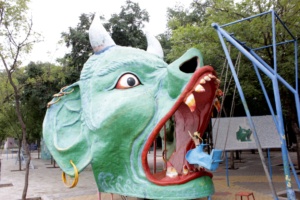 16. Surasa
16. Surasa
Surasa was a Rakshasi, mother of the Nagas. When Hanuman was on his flight to Lanka, she, at the bidding of gods who wanted to test his intelligence and resourcefulness, challenged Hanuman and said: ‘Enter my mouth. I have been without food for a long time and am eagerly waiting for you,’ and opened her mouth wide like a cave. Hanuman answered: ‘I am bent on doing Rama’s purpose. Do not stop me.’ ‘Impossible!’ said Surasa. ‘You must enter my mouth.’ Hanuman thought quickly and decided what to do. Step by step he made his body grow bigger and bigger and the Rakshasi opened her mouth correspondingly wider and wider. When the mouth thus became enormously wide, all of a sudden Hanuman contracted his body to a speck and, darting through her mouth, came out again and resumed his former normal shape. He then laughed and said: ‘You have had your wish, mother. I have entered your mouth. What more do you need?’ And Surasa blessed him saying, ‘Your effort will be crowned with success. I did this at the bidding of the gods who wanted to test you. Rama’s purpose, which you seek to serve, will assuredly triumph.’
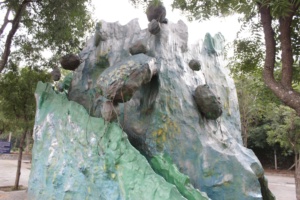 17. Sanjeevi Mountain
17. Sanjeevi Mountain
In the Rama – Ravana War. Kumbakaran was also killed. Angered by this Indrajit deputed the powerful Brahmastram on Rama and his army of monkeys. The entire army including Rama and Lakshmanan fell down unconscious. Hanuman was sole survivor Jambavan Somehow Managed to rise up and told hanuman, “Hey Maruthi! You can save us all by bringing the rare Sanjeevini herbs from one of the peaks at Kailash, in the Himalayan ranges. Then only we all can get back our lives.”
The next second hanuman shot up like a meteor towards the north, flew and landed on the peak having those medicinal herbs though these herbs shine even in day time, Hanuman did not want to delay, any time in searching for them hence, Hanuman lifted the entire peak in his right hand and flew back towards Lanka. Ah! What a miracle! The very powerful smell emanating from the Sanjeevini herbs rejuvenated fresh life to the entire army who were either dead, injured or lost their limbs! Come! Let us also climb this wonderful Sanjeevi Mountain, search for the herbs and get fresh life & energy. Let us also inherit the strength of Hanumanji!
